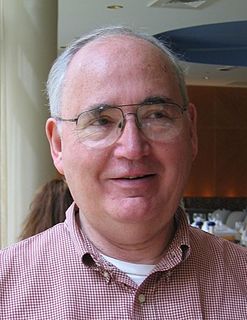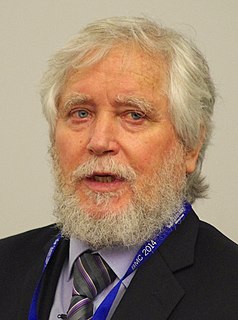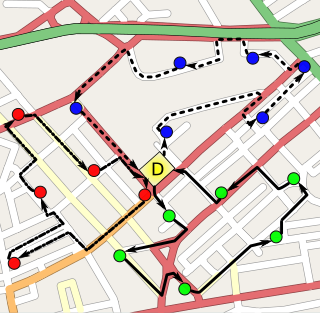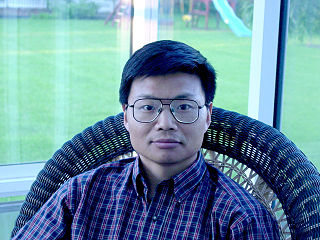Related Research Articles
Combinatorics is an area of mathematics primarily concerned with counting, both as a means and an end in obtaining results, and certain properties of finite structures. It is closely related to many other areas of mathematics and has many applications ranging from logic to statistical physics, from evolutionary biology to computer science, etc.

Stephen Cole Kleene was an American mathematician. One of the students of Alonzo Church, Kleene, along with Rózsa Péter, Alan Turing, Emil Post, and others, is best known as a founder of the branch of mathematical logic known as recursion theory, which subsequently helped to provide the foundations of theoretical computer science. Kleene's work grounds the study of computable functions. A number of mathematical concepts are named after him: Kleene hierarchy, Kleene algebra, the Kleene star, Kleene's recursion theorem and the Kleene fixed-point theorem. He also invented regular expressions in 1951 to describe McCulloch-Pitts neural networks, and made significant contributions to the foundations of mathematical intuitionism.

Tomaž (Tomo) Pisanski is a Slovenian mathematician working mainly in discrete mathematics and graph theory. He is considered by many Slovenian mathematicians to be the "father of Slovenian discrete mathematics."

Dana Stewart Scott is an American logician who is the emeritus Hillman University Professor of Computer Science, Philosophy, and Mathematical Logic at Carnegie Mellon University; he is now retired and lives in Berkeley, California. His work on automata theory earned him the Turing Award in 1976, while his collaborative work with Christopher Strachey in the 1970s laid the foundations of modern approaches to the semantics of programming languages. He has worked also on modal logic, topology, and category theory.
Combinatorics is a branch of mathematics concerning the study of finite or countable discrete structures.
In mathematics, Sperner's lemma is a combinatorial analog of the Brouwer fixed point theorem, which is equivalent to it.

Endre Szemerédi is a Hungarian-American mathematician and computer scientist, working in the field of combinatorics and theoretical computer science. He has been the State of New Jersey Professor of computer science at Rutgers University since 1986. He also holds a professor emeritus status at the Alfréd Rényi Institute of Mathematics of the Hungarian Academy of Sciences.

Albert William Tucker was a Canadian mathematician who made important contributions in topology, game theory, and non-linear programming.

Lloyd Stowell Shapley was an American mathematician and Nobel Prize-winning economist. He contributed to the fields of mathematical economics and especially game theory. Shapley is generally considered one of the most important contributors to the development of game theory since the work of von Neumann and Morgenstern. With Alvin E. Roth, Shapley won the 2012 Nobel Memorial Prize in Economic Sciences "for the theory of stable allocations and the practice of market design."

Baroness Ingrid Daubechies is a Belgian physicist and mathematician. She is best known for her work with wavelets in image compression.

László Lovász is a Hungarian-American mathematician and professor emeritus at Eötvös Loránd University, best known for his work in combinatorics, for which he was awarded the 2021 Abel Prize jointly with Avi Wigderson. He was the president of the International Mathematical Union from 2007 to 2010 and the president of the Hungarian Academy of Sciences from 2014 to 2020.

David Harold Blackwell was an American statistician and mathematician who made significant contributions to game theory, probability theory, information theory, and Bayesian statistics. He is one of the eponyms of the Rao–Blackwell theorem. He was the first African American inducted into the National Academy of Sciences, the first black tenured faculty member at the University of California, Berkeley, and the seventh African American to receive a Ph.D. in Mathematics.

Jack R. Edmonds is an American-born and educated computer scientist and mathematician who lived and worked in Canada for much of his life. He has made fundamental contributions to the fields of combinatorial optimization, polyhedral combinatorics, discrete mathematics and the theory of computing. He was the recipient of the 1985 John von Neumann Theory Prize.

Noga Alon is an Israeli mathematician and a professor of mathematics at Princeton University noted for his contributions to combinatorics and theoretical computer science, having authored hundreds of papers.

Hillel (Harry) Furstenberg is a German-born American-Israeli mathematician and professor emeritus at the Hebrew University of Jerusalem. He is a member of the Israel Academy of Sciences and Humanities and U.S. National Academy of Sciences and a laureate of the Abel Prize and the Wolf Prize in Mathematics. He is known for his application of probability theory and ergodic theory methods to other areas of mathematics, including number theory and Lie groups.

Applied mathematics is the application of mathematical methods by different fields such as physics, engineering, medicine, biology, finance, business, computer science, and industry. Thus, applied mathematics is a combination of mathematical science and specialized knowledge. The term "applied mathematics" also describes the professional specialty in which mathematicians work on practical problems by formulating and studying mathematical models.

Weinan E is a Chinese mathematician. He is known for his work in applied mathematics and machine learning. His academic contributions include novel mathematical and computational results in stochastic differential equations; design of efficient algorithms to compute multiscale and multiphysics problems, particularly those arising in fluid dynamics and chemistry; and pioneering work on the application of deep learning techniques to scientific computing. In addition, he has worked on multiscale modeling and the study of rare events.
Curtis Greene is an American mathematician, specializing in algebraic combinatorics. He is the J. McLain King Professor of Mathematics at Haverford College in Pennsylvania.

Alexander (Lex) Schrijver is a Dutch mathematician and computer scientist, a professor of discrete mathematics and optimization at the University of Amsterdam and a fellow at the Centrum Wiskunde & Informatica in Amsterdam. Since 1993 he has been co-editor in chief of the journal Combinatorica.
Adam Wade Marcus is an American mathematician. He holds the Chair of Combinatorial Analysis in the Institute of Mathematics at the École Polytechnique Fédérale de Lausanne. The team of Marcus, Daniel Spielman and Nikhil Srivastava was awarded the Pólya Prize in 2014 for their resolution of the Kadison–Singer problem and later the Michael and Sheila Held Prize in 2021 for their solution to long-standing conjectures in the study of Ramanujan graphs.
References
- 1 2 Faculty in Hunter's Computer Science Department, Hunter College , retrieved 2015-09-27.
- ↑ Graduation year from Cohen, Daniel I. A. (January 18, 2012), "Holding the line on A's", Letters to the editor, Princeton Alumni Weekly.
- ↑ Cohen, Daniel I. A. (1967), "On the Sperner lemma", Journal of Combinatorial Theory, 2 (4): 585–587, doi: 10.1016/s0021-9800(67)80062-0 .
- ↑ Daniel I. A. Cohen at the Mathematics Genealogy Project.
- ↑ CS Department History, Hunter College , retrieved 2015-09-27.
- ↑ Buchanan, Iain (1980), "Basic Techniques of Combinatorial Theory", Book Selection, Journal of the Operational Research Society, 31: 85, doi:10.1057/jors.1980.16, S2CID 62587403 .
- ↑ Ruth Hauptman wins inaugural Daniel I. A. Cohen Prize for Excellence in Theoretical Computer Science, Hunter College , retrieved 2015-09-27.